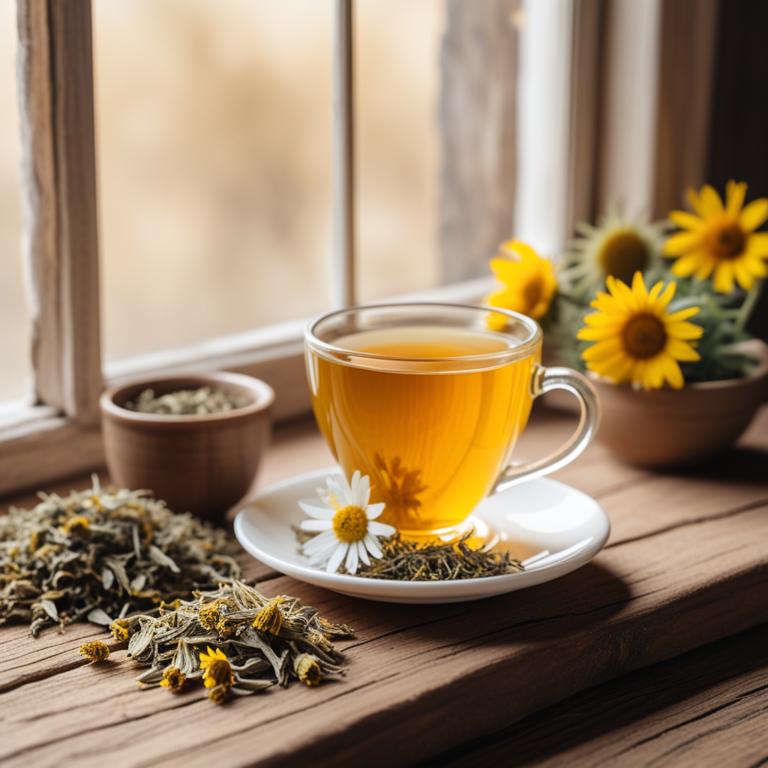8 Herbal Teas For Open Wounds

Herbal teas for open wounds are a natural way to promote healing and reduce the risk of infection.
These teas are made from herbs that have antibacterial, anti-inflammatory, and antiseptic properties, which help to clean and protect the wound. One of the most well-known herbs used for this purpose is Aloe barbadensis, also known as aloe vera. Aloe vera contains compounds that help to soothe and calm the skin, reducing inflammation and promoting the growth of new tissue. Calendula officinalis, or marigold, is another herb that's often used to treat wounds.
It has antiseptic properties that help to kill bacteria and prevent infection, while also promoting the healing process. Symphytum officinale, or comfrey, is a herb that's rich in allantoin, a compound that helps to stimulate the growth of new tissue and promote the healing of wounds. Drinking a tea made from these herbs can help to speed up the healing process, reduce scarring, and even reduce the risk of infection. This can be especially beneficial for people who have open wounds that are prone to infection or have trouble healing.
By using herbal teas to promote healing, you can reduce the risk of complications and promote a faster recovery.
- 1. Aloe barbadensis
- 2. Calendula officinalis
- 3. Symphytum officinale
- 4. Echinacea purpurea
- 5. Hypericum perforatum
- 6. Arnica montana
- 7. Urtica dioica
- 8. Plantago major
1. Aloe barbadensis

Aloe barbadensis teas contains bioactive constituents like aloin, aloe-emodin, and acemannan, which have anti-inflammatory and antimicrobial properties.
These properties help reduce swelling and fight off infections in open wounds. The aloe-emodin in Aloe barbadensis teas has been shown to inhibit the growth of bacteria and fungi that can cause infections. Acemannan, a polysaccharide, stimulates the production of growth factors that promote wound healing and tissue repair.
By reducing inflammation and promoting tissue repair, Aloe barbadensis teas can help create a favorable environment for open wounds to heal.
- Gather 1 cup of Aloe barbadensis leaves, 1 cup of boiling water, and a clean cup.
- Chop the Aloe leaves into small pieces and add them to the boiling water.
- Remove from heat and let it steep for 10-15 minutes.
- Strain the liquid and discard the Aloe pieces. Let it cool down.
- Soak a clean cloth in the cooled Aloe tea and apply it to the open wound for 30 minutes, 3-4 times a day.
2. Calendula officinalis

Calendula officinalis teas contains triterpenoid saponins, flavonoids, and carotenoids as its active constituents.
These compounds give the tea anti-inflammatory and antimicrobial properties, which help to prevent infection in open wounds. The triterpenoid saponins, in particular, have been shown to reduce inflammation and promote tissue repair. The flavonoids and carotenoids in the tea also have antioxidant properties, which help to protect the wound from oxidative stress and promote healing.
By reducing inflammation and preventing infection, Calendula officinalis teas can help to create a favorable environment for wound healing.
- Gather 1 cup of fresh Calendula officinalis flowers or 2 tablespoons of dried flowers.
- Combine the flowers with 1 cup of boiling water in a heat-resistant cup.
- Steep the mixture for 5-7 minutes, then strain it using a cheesecloth or a fine-mesh sieve.
- Let the tea cool down to room temperature before applying it to the wound.
- Dampen a clean cloth with the cooled tea and gently apply it to the wound, repeating as needed.
3. Symphytum officinale

Symphytum officinale teas contains rosmarinic acid and allantoin, which are key bioactive constituents that help with open wounds.
Rosmarinic acid has anti-inflammatory properties that reduce swelling and pain, creating an ideal environment for healing. Allantoin, on the other hand, stimulates collagen production and promotes tissue regeneration, speeding up the healing process. The antiseptic properties of Symphytum officinale also help to prevent infection, which is essential for wound healing.
By reducing inflammation, promoting tissue growth, and preventing infection, Symphytum officinale teas can be an effective treatment for open wounds.
- Gather 2 tablespoons of dried Symphytum officinale leaves.
- Pour 1 cup of boiling water over the leaves in a cup.
- Let the mixture steep for 5-7 minutes.
- Strain the liquid and discard the leaves.
- Soak a clean cloth in the tea and apply it to the open wound.
4. Echinacea purpurea

Echinacea purpurea teas contains active constituents like alkylamides, caffeic acid, and rosmarinic acid that help promote wound healing.
These compounds have antimicrobial properties, which prevent the growth of bacteria and other pathogens that can infect open wounds. The tea's anti-inflammatory properties, attributed to its alkaloid and glycoside content, reduce swelling and redness, creating an optimal environment for healing. The antioxidant properties of Echinacea purpurea help protect the wound from oxidative stress, which can slow down the healing process.
The combination of these properties in Echinacea purpurea teas can help accelerate the healing of open wounds by promoting a healthy environment and reducing the risk of infection.
- Gather Echinacea purpurea flowers and leaves from a trusted source. Use 1 cup of fresh or 2 cups of dried flowers and leaves.
- Heat 1 cup of water in a pot until it boils. Remove from heat.
- Add 1 tablespoon of the Echinacea purpurea mixture to the hot water. Let it steep for 5-10 minutes.
- Strain the tea into a clean cup using a tea strainer or a piece of cheesecloth. Discard the solids.
- Apply the cooled tea to the open wound using a clean cloth. Repeat as needed, but not more than 3 times a day.
5. Hypericum perforatum

Hypericum perforatum teas contains flavonoids, tannins, and phenolic acids, which are responsible for its healing properties.
The flavonoids, particularly rutin and quercetin, have anti-inflammatory and antimicrobial effects that help prevent infection and promote wound healing. The tannins in Hypericum perforatum teas have astringent properties, which help stop bleeding and reduce the risk of further damage to the wound. Additionally, the phenolic acids in the tea have antioxidant properties that protect the wound from oxidative stress and promote tissue repair.
By applying a compress soaked in Hypericum perforatum teas to an open wound, you can take advantage of these beneficial properties to promote healing and reduce the risk of complications.
- Gather Hypericum perforatum flowers and leaves. Use 1 cup of fresh or dried herbs.
- Measure 1 cup of water in a pot and bring to a boil.
- Add the Hypericum perforatum herbs to the boiling water and reduce heat.
- Steep for 5-7 minutes, then strain the liquid using a cheesecloth or a fine-mesh sieve.
- Let the tea cool down and apply it directly to the open wound using a clean cloth.
6. Arnica montana

Arnica montana teas contains bioactive constituents like flavonoids, phenolic acids, and triterpenoid saponins.
These compounds have anti-inflammatory and antimicrobial properties that help to reduce swelling and prevent infection in open wounds. The flavonoids in Arnica montana teas have antioxidant properties that promote tissue repair and reduce oxidative stress. The phenolic acids help to inhibit the growth of bacteria and other microorganisms that can cause infection in wounds.
By reducing inflammation and preventing infection, Arnica montana teas can help to create an environment that is conducive to wound healing.
- Gather 1 cup of fresh Arnica montana flowers and 2 cups of boiling water.
- Steep the flowers in the boiling water for 5-7 minutes.
- Strain the mixture through a cheesecloth or fine-mesh sieve into a clean cup.
- Add 1 tablespoon of honey to the tea (optional) and stir well.
- Let the tea cool before applying it to the open wound using a clean cloth or cotton ball.
7. Urtica dioica

Urtica dioica teas contains bioactive constituents such as histamine, flavonoids, and saponins.
These compounds have anti-inflammatory properties that help reduce swelling and promote healing in open wounds. The flavonoids, specifically quercetin, have antimicrobial activity that inhibits the growth of bacteria and other pathogens in the wound, reducing the risk of infection. Saponins, on the other hand, have hemostatic properties that help stop bleeding and promote blood clotting, which is essential for wound healing.
By reducing inflammation and promoting a clean environment for healing, Urtica dioica teas can aid in the recovery of open wounds.
- Gather 1 cup of fresh Urtica dioica leaves and stems, clean them with water, and dry them with a paper towel.
- Crush the dried Urtica dioica leaves and stems into a fine powder using a mortar and pestle or a coffee grinder.
- Mix 2 tablespoons of the Urtica dioica powder with 1 cup of boiling water in a heat-resistant cup or teapot.
- Let the mixture steep for 5-10 minutes, then strain it with a cheesecloth or a fine-mesh sieve into a clean cup.
- Use the cooled Urtica dioica tea as a topical solution for open wounds, applying it directly to the affected area with a clean cloth.
8. Plantago major

Plantago major teas contains a rich mix of bioactive constituents, including flavonoids, phenolic acids, and saponins.
These compounds have anti-inflammatory and antimicrobial properties, which help to reduce swelling and prevent infection in open wounds. The flavonoids in Plantago major teas, specifically apigenin and luteolin, have been shown to inhibit the growth of bacteria and fungi, promoting a clean environment for healing. The saponins in the tea have been found to enhance wound closure by stimulating the production of collagen and improving tissue strength.
By reducing inflammation and promoting a healthy environment, Plantago major teas can help to accelerate the healing process and minimize the risk of complications.
- Gather Plantago major leaves (1 cup) and clean water (1 cup).
- Chop the Plantago major leaves into small pieces and put them in a saucepan.
- Pour the clean water over the Plantago major leaves and heat the mixture on low heat for 5-7 minutes.
- Strain the mixture through a cheesecloth or a fine-mesh sieve into a cup. Discard the solids.
- Let the tea cool, then use it as a compress on the open wound. Repeat as needed.